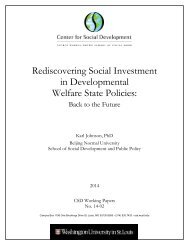Exploring and Assessing Intercultural Competence - Center for ...
Exploring and Assessing Intercultural Competence - Center for ...
Exploring and Assessing Intercultural Competence - Center for ...
Create successful ePaper yourself
Turn your PDF publications into a flip-book with our unique Google optimized e-Paper software.
<strong>Exploring</strong> <strong>and</strong> <strong>Assessing</strong> <strong>Intercultural</strong> <strong>Competence</strong><br />
challenging moments. It gives them pleasure in “becoming” like their hosts <strong>and</strong> “becoming” part<br />
of their society <strong>and</strong> culture – certainly not a disposition shared by all who enter other cultures.<br />
They undergo voluntary acculturation <strong>and</strong> welcome ef<strong>for</strong>ts by their hosts to “assimilate” them.<br />
The result, at whatever their level of attainment, is a satisfying, rewarding, <strong>and</strong> enriching<br />
experience in which the positive aspects far outweigh the negative, as they perceive them. They<br />
seek to move beyond the “etic” <strong>and</strong> into an “emic” posture insofar as possible. They transcend<br />
<strong>and</strong> trans<strong>for</strong>m their native paradigm as they seek to grasp another. This is probably the height of<br />
that experience one commonly hears about from such individuals returning from an intercultural<br />
journey: They learned a lot about their hosts <strong>and</strong> the host culture, <strong>and</strong> they learned even more<br />
about their own.<br />
These are all reasons successful intercultural sojourners seek to perpetuate <strong>and</strong> extend this<br />
significant, provocative, <strong>and</strong> “life-altering” experience even after it has ended <strong>and</strong> they return<br />
home. They reflect these sentiments through their own words <strong>and</strong> actions. After re-entry, 6 of the<br />
8 British volunteers spoke of the positive nature of their experience, 6 continued to study<br />
Spanish, 8 developed new intercultural friendships, 3 now work in related fields, 5 continued to<br />
use their intercultural abilities, <strong>and</strong> 7 maintained ongoing contact with hosts in various ways.<br />
And, after returning home, all 20 Swiss volunteers spoke of their experience in positive terms, 10<br />
continued to study another language (7 in Spanish), 7 pursued a related field of study, 19<br />
developed new intercultural relationships, 6 now work in a related field, 19 continued to use their<br />
intercultural abilities, <strong>and</strong> 19 maintained contact with hosts in various ways – by letter or email<br />
(19), occasional phone conversations (12), exchanging gifts (6), return visits (4), <strong>and</strong> receiving<br />
their hosts as visitors in Switzerl<strong>and</strong> (2).<br />
Assertion No. 5<br />
All parties in intercultural contact are affected to some degree <strong>and</strong> in various ways<br />
Discussion<br />
From survey responses <strong>and</strong> comments made in interviews, it became apparent how civic service<br />
volunteers were affected by their intercultural experience. They described the experience as lifechanging<br />
– they learned more about others, about the world, <strong>and</strong> about themselves. They<br />
developed new knowledge, skills, positive attitudes, <strong>and</strong> awareness (cf. Part VII). This was<br />
obvious in the section above <strong>and</strong> carries over into this area as well. Comments like those below<br />
reflect the on-going nature of the experience even after the program has long since ended:<br />
- I will be in touch with my hosts <strong>for</strong> many years to come<br />
- I returned to Ecuador with husb<strong>and</strong><br />
- I maintain regular contact with my host family<br />
- I am still in contact with hosts even after 5 years<br />
- host family also visited them in the UK<br />
Summary<br />
How volunteers were affected is abundantly clear from the comments cited here <strong>and</strong> those above.<br />
How mentors (<strong>and</strong> other hosts) were also affected will become apparent in later sections that deal<br />
with responses obtained from the Mentor survey <strong>for</strong>ms.<br />
<strong>Center</strong> <strong>for</strong> Social Development<br />
Washington University in St. Louis<br />
43
















